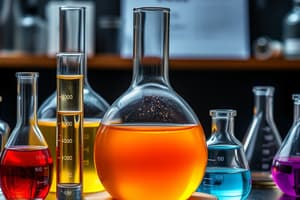Podcast
Questions and Answers
What is the primary goal of science?
What is the primary goal of science?
- To discover and explain natural phenomena. (correct)
- To prove pre-existing beliefs.
- To design artistic creations.
- To create new technologies.
Which of the following is the first step in the scientific method?
Which of the following is the first step in the scientific method?
- Observation. (correct)
- Hypothesis Formation.
- Experimentation.
- Analysis.
Which branch of science deals with the study of living organisms?
Which branch of science deals with the study of living organisms?
- Chemistry.
- Physics.
- Geology.
- Biology. (correct)
What is a scientific theory?
What is a scientific theory?
What is the standard unit of mass in the SI system?
What is the standard unit of mass in the SI system?
Which instrument is used to magnify small objects for study?
Which instrument is used to magnify small objects for study?
What does data analysis primarily involve?
What does data analysis primarily involve?
Where are scientific papers typically published?
Where are scientific papers typically published?
What is a crucial aspect of ethics in science?
What is a crucial aspect of ethics in science?
What is one significant impact of science on society?
What is one significant impact of science on society?
Flashcards
What is Science?
What is Science?
A systematic approach to understanding the natural world through observation, experimentation, and analysis.
What is the Scientific Method?
What is the Scientific Method?
A method of acquiring knowledge through observation, hypothesis, experimentation, and analysis.
What is a Hypothesis?
What is a Hypothesis?
A testable explanation for a phenomenon, often stating a cause-and-effect relationship.
What is Physics?
What is Physics?
Signup and view all the flashcards
What is Chemistry?
What is Chemistry?
Signup and view all the flashcards
What is Biology?
What is Biology?
Signup and view all the flashcards
What is a Scientific Theory?
What is a Scientific Theory?
Signup and view all the flashcards
What is a Scientific Law?
What is a Scientific Law?
Signup and view all the flashcards
What is Scientific Communication?
What is Scientific Communication?
Signup and view all the flashcards
What are Ethics in Science?
What are Ethics in Science?
Signup and view all the flashcards
Study Notes
- Science uses a systematic and organized method to gain insight of the world through observation, experimentation, and analysis.
- Science includes different subjects like physics, chemistry, biology, astronomy, and geology.
- The purpose of science is to find and explain natural events, and to create theories and laws to predict what will happen.
- Science depends on proof, logic, and questioning to build and improve knowledge.
Scientific Method
- The scientific method gains knowledge via. observation, hypothesis creation, experimentation, and analysis.
- Observation involves gathering data about the natural world through the senses or with the aid of instruments.
- A hypothesis is a testable explanation for a phenomenon, often stated as a cause-and-effect relationship.
- Experimentation involves designing and conducting controlled tests to gather evidence that supports or refutes a hypothesis.
- Analysis involves interpreting the results of experiments and drawing conclusions about the validity of the hypothesis.
- The scientific method is iterative, meaning that the results of one experiment can lead to new hypotheses and further investigation.
Branches of Science
- Physics studies matter, energy, and the basic forces of the universe.
- Physics includes mechanics, thermodynamics, electromagnetism, optics, and quantum mechanics.
- Chemistry focuses on the composition, structure, properties, and reactions of matter.
- Chemistry studies atoms, molecules, their interactions, and the creation of new materials.
- Biology studies living things, their structure, how they work, how they grow, how they change, and their relationships with their surroundings.
- Biology includes genetics, ecology, physiology, anatomy, and microbiology.
- Astronomy studies space objects like stars, planets, galaxies, and the entire universe.
- Astronomy uses telescopes, satellites, and other tools to observe and study cosmic phenomena.
- Geology studies Earth, its structure, what it is made of, and the processes that have shaped it over time.
- Geology covers plate tectonics, volcanism, erosion, and the creation of rocks and minerals.
Scientific Theories and Laws
- A scientific theory explains something in the natural world with facts, laws, inferences, and tested hypotheses.
- Theories are based on a lot of proof and are confirmed repeatedly through observation and testing.
- A scientific law describes a pattern in nature that is observed regularly.
- Laws are usually expressed with math and are thought to be true everywhere under specific conditions.
- Theories explain why laws exist and offer a bigger picture for understanding what happens in nature.
Measurement and Units
- Measurement assigns a number to a physical amount.
- Units are standard amounts used to express measurements.
- The International System of Units (SI) is the most common system of units used in science.
- SI base units include the meter (m) for length, the kilogram (kg) for mass, the second (s) for time, the ampere (A) for electric current, the kelvin (K) for temperature, the mole (mol) for amount of substance, and the candela (cd) for luminous intensity.
- Derived units combine base units; the newton (N) for force is kg⋅m/s².
Scientific Instruments
- Scientific instruments are tools and devices used to make observations, conduct experiments, and gather data.
- Examples of scientific instruments include microscopes, telescopes, spectroscopes, centrifuges, and particle accelerators.
- Microscopes magnify tiny objects and structures so scientists can study cells, tissues, and microorganisms.
- Telescopes observe far-off space objects like stars, planets, and galaxies.
- Spectroscopes study light and other electromagnetic radiation, giving information about the makeup and characteristics of materials.
- Centrifuges separate substances by density, such as cells from blood or molecules from solutions.
- Particle accelerators speed up subatomic particles to high speeds, letting scientists study the basic building blocks of matter.
Data Analysis and Statistics
- Data analysis organizes, summarizes, and interprets data to find patterns, trends, and relationships.
- Statistics is a math field that collects, analyzes, interprets, and presents data.
- Descriptive statistics summarize and describe the main features of a dataset; they use mean, median, mode, standard deviation, and range.
- Inferential statistics are used to make inferences and draw conclusions about a population based on a sample of data.
- Statistical tests determine the significance of differences or relationships between groups or variables.
- Error analysis assesses the accuracy and precision of measurements and calculations.
Scientific Communication
- Scientific communication shares scientific findings and ideas through publications, presentations, and other ways.
- Scientific papers are published in peer-reviewed journals, where experts assess their quality and validity.
- Scientific conferences and meetings let scientists present work, exchange ideas, and connect with colleagues.
- Science communication also informs the public about science to promote understanding and interest.
Ethics in Science
- Ethics in science means acting with honesty, integrity, and responsibility in scientific research.
- Scientists must do research carefully and without bias, and report results accurately.
- Ethical considerations include protecting human subjects and animals in research, and avoiding conflicts of interest.
- Scientific misconduct like fabrication, falsification, and plagiarism breaks ethical standards and has serious consequences.
Impact of Science on Society
- Science has greatly impacted society, advancing medicine, technology, agriculture, and more.
- Scientific discoveries have improved health, increased understanding of nature, and created life-changing technologies.
- Science is key to addressing global issues like climate change, disease, and food security.
- Science can have unintended effects; it is important to consider the ethical and social implications of advances.
Studying That Suits You
Use AI to generate personalized quizzes and flashcards to suit your learning preferences.




